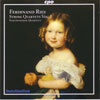Ries String Quartets, Vol 1
No mistaking his master’s voice in Ries’s diverting quartets
View record and artist detailsRecord and Artist Details
Composer or Director: Ferdinand Ries
Genre:
Chamber
Label: CPO
Magazine Review Date: 8/2006
Media Format: CD or Download
Media Runtime: 53
Mastering:
Stereo
DDD
Catalogue Number: CPO777 014-2

Tracks:
| Composition | Artist Credit |
|---|---|
| String Quartet |
Ferdinand Ries, Composer
Ferdinand Ries, Composer Schuppanzigh Quartet |
Author: Richard Wigmore
‘He imitates me too much’ was Beethoven’s reported verdict on his pupil and amanuensis Ferdinand Ries. He had a point. The opening of the E flat Quartet, WoO10, composed in 1805 while Ries was still taking lessons with Beethoven, begins with a paraphrase of the opening of Op 18 No 2 and continues with a ‘second subject’ strongly reminiscent of Op 18 No 4. The C major Quartet, WoO37, composed shortly after Beethoven’s death, is even more indebted to the master. Indeed, the first three movements are an overt homage to Beethoven’s third Razumovsky Quartet.
Ries, though, was temperamentally far more easy-going than his teacher; and these quartets have little of Beethoven’s strangeness and brusqueness, or his strenuous motivic development. But Ries proves an expert craftsman, with an appealing vein of cantabile melody and a feeling for well placed harmonic surprise. Highlights include the vivid minuet of the E flat, full of nagging cross-rhythms à la Haydn and Beethoven, and the fiery polonaise trio that disrupts the courtly suavity of the C minor’s minuet.
Playing on period instruments with an agreeable touch of astringency, the Schuppanzigh are lively and skilful advocates of these likeable quartets. They bring plenty of colour and rhythmic energy to the fast movements (with some deft virtuosity from the leader in the two finales) and shape the lyrical melodies eloquently. Anyone investigating the disc, though, should beware of another of CPO’s moronically translated notes.
Ries, though, was temperamentally far more easy-going than his teacher; and these quartets have little of Beethoven’s strangeness and brusqueness, or his strenuous motivic development. But Ries proves an expert craftsman, with an appealing vein of cantabile melody and a feeling for well placed harmonic surprise. Highlights include the vivid minuet of the E flat, full of nagging cross-rhythms à la Haydn and Beethoven, and the fiery polonaise trio that disrupts the courtly suavity of the C minor’s minuet.
Playing on period instruments with an agreeable touch of astringency, the Schuppanzigh are lively and skilful advocates of these likeable quartets. They bring plenty of colour and rhythmic energy to the fast movements (with some deft virtuosity from the leader in the two finales) and shape the lyrical melodies eloquently. Anyone investigating the disc, though, should beware of another of CPO’s moronically translated notes.
Discover the world's largest classical music catalogue with Presto Music.

Gramophone Digital Club
- Digital Edition
- Digital Archive
- Reviews Database
- Full website access
From £8.75 / month
Subscribe
Gramophone Full Club
- Print Edition
- Digital Edition
- Digital Archive
- Reviews Database
- Full website access
From £11.00 / month
Subscribe
If you are a library, university or other organisation that would be interested in an institutional subscription to Gramophone please click here for further information.




